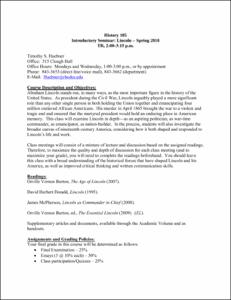Please use this identifier to cite or link to this item:
http://hdl.handle.net/10267/15499Full metadata record
| DC Field | Value | Language |
|---|---|---|
| dc.contributor.author | Huebner, Timothy S. | - |
| dc.date.accessioned | 2013-02-20T16:31:24Z | - |
| dc.date.available | 2013-02-20T16:31:24Z | - |
| dc.date.issued | 2010-01-13 | - |
| dc.identifier.uri | http://hdl.handle.net/10267/15499 | - |
| dc.description | This syllabus was submitted to the Office of Academic Affairs by the course instructor. Uploaded by Archives RSA Josephine Hill. | en_US |
| dc.description.abstract | Abraham Lincoln stands out, in many ways, as the most important figure in the history of the United States. As president during the Civil War, Lincoln arguably played a more significant role than any other single person in both holding the Union together and emancipating four million enslaved African Americans. His murder in April 1865 brought the war to a violent and tragic end and ensured that the martyred president would hold an enduring place in American memory. This class will examine Lincoln in depth—as an aspiring politician, as war-time commander, as emancipator, as nation-builder. In the process, students will also investigate the broader canvas of nineteenth-century America, considering how it both shaped and responded to Lincoln’s life and work. Class meetings will consist of a mixture of lecture and discussion based on the assigned readings. Therefore, to maximize the quality and depth of discussion for each class meeting (and to maximize your grade), you will need to complete the readings beforehand. You should leave this class with a broad understanding of the historical forces that have shaped Lincoln and his America, as well as improved critical thinking and written communication skills. | en_US |
| dc.language.iso | en_US | en_US |
| dc.publisher | Memphis, Tenn. : Rhodes College | en_US |
| dc.relation.ispartofseries | Syllabi CRN;20152 | - |
| dc.rights | Rhodes College owns the rights to the archival digital objects in this collection. Objects are made available for educational use only and may not be used for any non-educational or commercial purpose. Approved educational uses include private research and scholarship, teaching, and student projects. For additional information please contact archives@rhodes.edu. Fees may apply. | - |
| dc.subject | History, Department of | en_US |
| dc.subject | Syllabus | en_US |
| dc.subject | Curriculum | en_US |
| dc.subject | Academic departments | en_US |
| dc.subject | Text | en_US |
| dc.subject | 2010 Spring | en_US |
| dc.title | HIST 105-01, Introductory Seminar: Lincoln, Spring 2010 | en_US |
| dc.type | Syllabus | en_US |
| Appears in Collections: | Course Syllabi | |
Files in This Item:
| File | Description | Size | Format | |
|---|---|---|---|---|
| 2010_spring_HIST_105-01_20152.pdf | 246.29 kB | Adobe PDF |  View/Open |
Items in DSpace are protected by copyright, with all rights reserved, unless otherwise indicated.